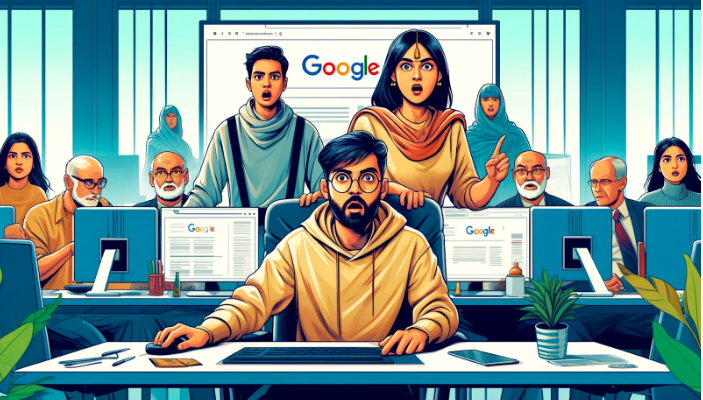Friends, the way Google shows website listings in its search results has gone through major updates in March 2024 (Core Update)- one of the biggest since the legendary Panda and Penguin updates. This sweeping algorithmic change has deindexed hundreds of websites and delivered a body blow to low-quality and AI-generated content across the web.
If you’re an SEO professional or website owner, buckle up! This update demands a shift in your content strategy to keep riding the Google rankings wave. But first, let’s dive into what exactly this colossal update entails.
The AI Content Crackdown

One of the core targets of the March 2024 update is AI-generated spam and low-quality content. Google has made it crystal clear- the days of using AI writing tools to churn out subpar, unoriginal content for ranking purposes are over.
Research by Originality.ai revealed a staggering 100% of the websites deindexed in the early stages of this update showed signs of AI-generated posts. A whopping 50% had a jaw-dropping 90-100% of their content produced by AI!
Also Read: Difference Between Dofollow and Nofollow
These sites have paid a heavy price, with over 800 websites being completely delisted from Google’s index so far. This catastrophic loss of visibility has translated into millions of organic visits and hundreds of thousands of dollars in ad revenue vanishing into thin air each month.
The message is loud and clear – if you want to keep ranking well on Google, original, high-quality, human-generated content is now the only way to go.
Algorithmic Enhancements for Higher Quality

But the March 2024 update isn’t just about cracking down on AI abuse; it’s a comprehensive revamp of Google’s core ranking systems. The search engine has turbo-charged its algorithms to better understand when web pages could provide more helpful information, offer an improved user experience, or seem to exist solely for search engines rather than human visitors.
Google states these enhancements, combined with previous efforts to curb low-quality content, will collectively reduce such content in search results by a staggering 40%. That’s a massive shift that will fundamentally reshape what kind of pages rank at the top.
To stay ahead of the curve, creating insightful, original, and deeply researched content that truly benefits your audience is paramount. Generic, surface-level posts regurgitating easily available information won’t cut it anymore.
Also Read: Exit Rate in Digital Marketing
New Spam Policies: The Wider Net
Along with the core ranking updates, Google has expanded its spam policies to tackle more deceptive behaviors at scale. Three key new areas being targeted are:
Scaled Content Abuse
Using automation and/or human efforts to mass-produce low-quality, unoriginal content solely to manipulate rankings.
Site Reputation Abuse
Trusted websites publishing thin, outsourced content to capitalize on their domain’s reputation. For example, paid reviews on educational sites.
Expired Domain Abuse
Purchasing expired domains and repurposing them with low-quality affiliate content, misleading users about the site’s true nature.
These policy expansions allow Google to take firmer action against sites employing such tactics, even issuing manual penalties where appropriate. The net has been cast wider, so auditing your content strategies for any potentially manipulative practices is critical.
The Link Signals Shakeup
The role of links as a ranking signal has been shaken up too. In a surprising move, Google has deemphasized the “importance” of links for determining relevance.
At the same time, new link-focused penalties have been introduced:
- Creating low-value content primarily for accumulating manipulative links
- Any links intended to boost rankings, including manipulative outgoing links
- Building sites on expired domains solely to transfer ranking signals
While links remain a factor, these changes suggest Google is evolving how it evaluates link equity and clamping down harder on aggressive link-building tactics.
The smart move is to focus on naturally attracting editorial links through outstanding content combined with solid digital PR. The old-school link building tricks are losing their punch.
Adapting to the Human-First Era
As artificial intelligence advances, human qualities like first hand expertise, original analysis, and credible sourcing have become even more precious ranking commodities for Google.
This core update underscores Google’s laser focus on prioritizing content that demonstrates these uniquely human qualities. The message is clear – augmenting your content with AI is okay, but relying solely on machines is a surefire path to deindexation.
Some key content attributes this update promotes:

- Firsthand expertise and depth of knowledge (e.g. product reviews by actual users)
- Original research, reporting and insightful analysis beyond obvious angles
- Credible sourcing, fact-checking, and evidence of authority
- Clear author bios highlighting relevant experience and credentials
To adapt, look at incorporating more first-person perspectives, proprietary data and exclusive interviews into your content mix. Having real experts creating content is now more critical than ever before.
Also Read: What Does the Term Sandbox Mean in SEO
The Human Element: Content Quality Over Quantity
While some punishments came automatically via Google’s algorithms, other crackdowns involved direct human review and penalties from Google’s employees. These personalized manual penalties suggest Google will put in extra effort to remove blatant offenders providing a poor experience.
So what causes these manual penalties? Things like participating in private spam-sharing communities or publicly boasting about blackhat SEO tricks are surefire ways to get flagged for human review. The lesson? Keep a low profile on the manipulation side of SEO.
Enhancing the User Experience
While this colossal update will take a full month to fully roll out, one key priority is already evident – Google now heavily favors quality over quantity when it comes to content.
Tried-and-tested practices like leveraging topic cluster models and creating 10X content pillars become even more vital. Having a solid editorial process focused on crafting definitive, exhaustively researched guides is the best way to catch Google’s eye.
At the same time, the update is a wake-up call to reassess any bloated, keyword-stuffed, or mal-intentioned content across your web properties. Low-quality Pages offering no unique value are being singled out for demotion or removal with surgical precision.
Also Read: SEO Scope of Work
The Future: Where SEO Goes from Here
As an SEO professional in 2024, I can confidently say the March Core Update marks both an ending and a new beginning for our industry. The ending of the AI-content spam era and aggressive link building gimmicks. The start of a human-centric era where expertise, authenticity and editorial quality reign supreme.
This is a resetting of the playing field – one that rewards websites focusing on delivering a stellar user experience and truly valuable content over shallow tactics. Those who lean into this mindset will continue to thrive and grow their organic visibility for years to come.
However, I expect a period of recalibration and strategizing as SEOs analyze the full impact of this update. Just like after Panda and Penguin, we’ll need to identify weaknesses in outdated methodologies and map out a new path forward fully optimized for this human-focused paradigm.
Google has raised the bar once again, challenging us to elevate our craft to new creative and strategic heights. But those who can adapt to this quality-primera environment will be uniquely poised to stay ahead of the curve and keep winning at SEO in our AI-driven world.
The March 2024 update may have shaken the SEO realm to its core – but it has also sparked an exciting new era of opportunity for pioneering professionals ready to embrace intelligent innovation within the boundaries of what truly benefits users. Bring it on.
FAQs
Google updates in SEO are changes to its algorithms that enhance search result relevance and quality, often targeting specific SEO tactics and refining ranking factors.
SEO will likely exist in 5 years but will evolve with technological advances and changing user behaviors, adapting to new search methodologies and platforms.
SEO is a dynamic career choice within digital marketing, requiring ongoing learning and offering diverse opportunities as businesses increasingly depend on online visibility.
SEO typically involves monthly activities such as content updates, keyword research, and performance analysis to continuously improve and maintain search rankings.
Mohit Verma
I am an experienced professional with 9+ years of experience in Search Engine Optimization. I am on a mission to provide industry focused job oriented SEO so the students/mentees can get their dream SEO job and and start working from day 1.
